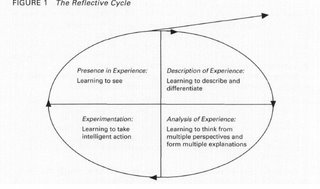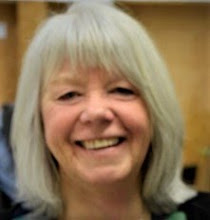starting out
Ah the doctorate!. This year I will be sampling for the main research study. I have made quite a change in my plan of attack since running the pilot last year.
The strategies I had in place for the pilot were too complex. Since writing up the pilot and meeting with a critical friend, I have moved between two areas of approach. I was going to try out some metacognitive strategies - plan, monitor, evaluate with self-questioning....but now I have been persuaded to stick with reflection. apparently the literature on metacognition is too fragmented...the research on reflection is much more consolidated.
So today I have been doing lots of reading about reflection, so I can link the reflective framework I am sketching out to some previous research. My critical friend suggested using three overarching questions about decisions made during an assignment ...my participants will be students in an teacher education course at the university I am studying at: University of Wollongong. They will be asked to keep a journal as they prepare an assignment.
In the reading today, I refreshed myself about Jennifer Moon and Donald Schon's models.
Moon has five levels:
1. noticing - what is known, perceptions of purpose, emotional responses, presentation of material - superficial
2. making sense - organise and order material - superficial
3. making meaning - assimilate, link to what is known, understand material - deep
4. working with meaning - reflection, generate ideas, review how knowledge influences actions - deep
5. transformative learning - cognitive adjustments increase further, awareness of learning process, judgements about usefulness.
Schon - reflection-in-action and reflection-on-action (easier and most common).
Hatton and Smith (1995) have developed a five level approach based on Schon. I need to read more about this.
1. technical
2. descriptive
3. dialogical
4. critical reflection
5. reflection-in-action
I particularly liked the reflective cycle put forward by Rodgers ( 2002) and have started to explore this. see diagram:
 Rodgers compared to Moon (1999)
Rodgers compared to Moon (1999)
1. presence in experience - similar to noticing and making sense (Moon) also mindfulness
2. description of experience - free writing - making sense (Moon)
3. analysis of experience - making meaning and working with meaning (Moon)
4. experimentation - working with meaning & transformative learning
Rodgers does not really fully have an equivalent to transformative learning but I guess the transformation occurs when the learner changes their ideas and actions following a period of reflection. Zepke (2003) refers to Kolb's experiential cycle in the book called reflection to transformation (Eds) (Zepke, N, Nuent, D. & Leach, L.) lent to me by a dear colleague. I also found a very practical model for reflective journaling in R's study book Burns, T. & Sinfield, S. (2003). Essential study skills: the complete guide to
success @ university. London: Sage Publications Ltd.
The trouble is the reflective framework I want to use needs to be suitable for when they actually write their reflective journal while doing the assignment and also when they formulate their supporting statement to go with the product they are designing and developing. A discussion with my daughter made me realise that both will be reflection-on-action.....ah but which model will I align with? More tomorrow.....
The strategies I had in place for the pilot were too complex. Since writing up the pilot and meeting with a critical friend, I have moved between two areas of approach. I was going to try out some metacognitive strategies - plan, monitor, evaluate with self-questioning....but now I have been persuaded to stick with reflection. apparently the literature on metacognition is too fragmented...the research on reflection is much more consolidated.
So today I have been doing lots of reading about reflection, so I can link the reflective framework I am sketching out to some previous research. My critical friend suggested using three overarching questions about decisions made during an assignment ...my participants will be students in an teacher education course at the university I am studying at: University of Wollongong. They will be asked to keep a journal as they prepare an assignment.
In the reading today, I refreshed myself about Jennifer Moon and Donald Schon's models.
Moon has five levels:
1. noticing - what is known, perceptions of purpose, emotional responses, presentation of material - superficial
2. making sense - organise and order material - superficial
3. making meaning - assimilate, link to what is known, understand material - deep
4. working with meaning - reflection, generate ideas, review how knowledge influences actions - deep
5. transformative learning - cognitive adjustments increase further, awareness of learning process, judgements about usefulness.
Schon - reflection-in-action and reflection-on-action (easier and most common).
Hatton and Smith (1995) have developed a five level approach based on Schon. I need to read more about this.
1. technical
2. descriptive
3. dialogical
4. critical reflection
5. reflection-in-action
I particularly liked the reflective cycle put forward by Rodgers ( 2002) and have started to explore this. see diagram:
 Rodgers compared to Moon (1999)
Rodgers compared to Moon (1999)1. presence in experience - similar to noticing and making sense (Moon) also mindfulness
2. description of experience - free writing - making sense (Moon)
3. analysis of experience - making meaning and working with meaning (Moon)
4. experimentation - working with meaning & transformative learning
Rodgers does not really fully have an equivalent to transformative learning but I guess the transformation occurs when the learner changes their ideas and actions following a period of reflection. Zepke (2003) refers to Kolb's experiential cycle in the book called reflection to transformation (Eds) (Zepke, N, Nuent, D. & Leach, L.) lent to me by a dear colleague. I also found a very practical model for reflective journaling in R's study book Burns, T. & Sinfield, S. (2003). Essential study skills: the complete guide to
success @ university. London: Sage Publications Ltd.
The trouble is the reflective framework I want to use needs to be suitable for when they actually write their reflective journal while doing the assignment and also when they formulate their supporting statement to go with the product they are designing and developing. A discussion with my daughter made me realise that both will be reflection-on-action.....ah but which model will I align with? More tomorrow.....

